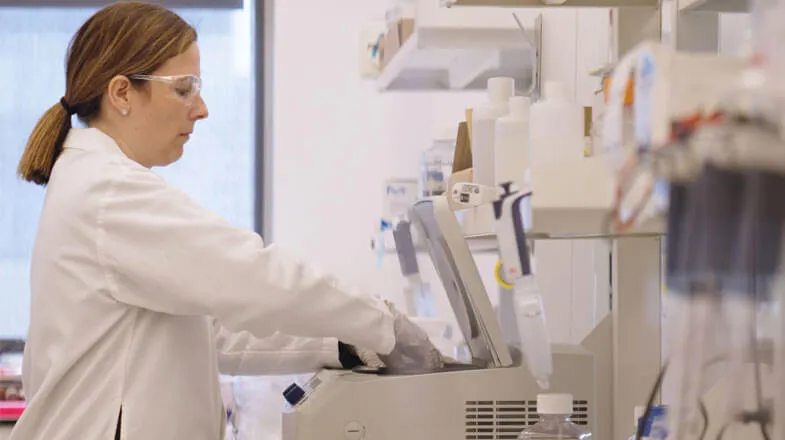Article
Featured Articles
Read our latest stories on the people and scientific innovations making a difference in patients’ lives.
Science & Innovation
Pursuing the Next Breakthrough in Cancer Cachexia
Cachexia, a complex wasting syndrome, impacts an estimated 9 million people worldwide.[i] In people living with cancer, cachexia can diminish the tolerance of therapies and is linked to reduced survival rates. Currently, there are no FDA-approved treatments targeting its underlying cause.Over time, the way researchers and physicians understand cachexia has evolved, with growing focus on uncovering the biology behind this devastating disease.In an effort to address a critical gap in care and help...
Science & Innovation
Brighter Together: How the Pharmaceutical Industry is Shining a Light on a Rare Cause of Heart Failure
Roughly one in three Americans is at risk for heart failure1, a condition where the heart can no longer effectively pump blood. And one in four will develop heart failure at some point in their lives1. Behind these statistics is a complex issue: the causes of heart failure differ widely among affected individuals. And identifying the underlying cause – especially if it’s rare – can be tricky.Among the less recognized causes is transthyretin amyloid cardiomyopathy, or ATTR-CM, which can mimic...
Trusted Voices
You’ve Still Got It: Aging with Agency to Stay on Top of Your Health Year-Round
by Aamir Malik Aamir Malik is Executive Vice President, Chief U.S. Commercial Officer, Pfizer Inc. and a member of Pfizer's Executive Leadership Team. Today, he writes about the importance of taking control of your health as you age, and shares advice from Leticia Acevedo, a North Carolina-based nursing professional and professor.Nowadays, people are striving to live their best lives — traveling, dancing, learning new skills, and embracing life with energy and purpose — all the while showing us...
Science & Innovation
Developing a Path Forward in Cancer Cachexia
Across disciplines, therapeutic areas, and even continents, Pfizer scientists have been working to advance understanding of – and potential treatments for – cachexia, a complex metabolic condition associated with certain chronic conditions, such as cancer, and characterized by severe weight loss, decreased appetite, fatigue, and muscle wasting. Its symptoms can often be misattributed, and there are currently no FDA-approved treatments targeting its root cause.But, over the past decade, the...
Real People
How One Woman with Multiple Myeloma Found Strength—and Gratitude—in Adversity
September’s Blood Cancer Awareness Month is a time to raise awareness of hematologic cancers and share the stories of those living with the diseaseIn 2017, Lynce Lucas hadn’t been feeling well for several months and was dealing with some fractured ribs. But when she woke up one morning struggling with the ability to walk, she knew something more was wrong.Lynce was diagnosed with multiple myeloma, which at the time she didn’t know much about. “They told me that multiple myeloma was cancer, it...
Programs & Initiatives
Pfizer's Global Health Fellows Program: Leveraging Colleagues’ Expertise to Help Improve Healthcare Access Around the World
Global Health Fellows (GHF) is Pfizer’s signature skills-based volunteering program, empowering colleagues to lend their skills and expertise to global health partners in underserved communities around the world. For over 20 years, the program has helped to strengthen health systems and close the health equity gap in communities that need it most. Through the program, Pfizer colleagues have participated in pro bono consulting projects across Africa, Asia, Latin America, and the U.S., where they...
Programs & Initiatives
Not for Granted: Pediatric Immunization Through Experts’ Lens
New survey fielded by Excellence in Pediatrics Institute, with support from Pfizer, aims to uncover challenges and find solutions to gaps in pediatric vaccination rates in Europe
Purpose & Ideals
The Mindfulness of Medicine Development: How Scientists Are Driving the Next Wave of Medical Innovations
For millions of patients around the world, the development of a new treatment or vaccine can be life-changing. But the journey from promising drug candidate to approved product isn’t easy. It's a long and arduous process, with an average timeline lasting more than 10 years.Behind the scenes of these life-changing medical breakthroughs are the scientists whose dedication, expertise, and remarkable problem-solving skills are driving progress forward. Though their training could have prepared them...
Programs & Initiatives
Bridging Global Gaps in Hemophilia Care
Pfizer is proud of its commitment to advancing hemophilia care for more than 40 years, dating back to the introduction of recombinant therapies. But while there has been transformative progress as well as advances in the hemophilia treatment landscape during this time, there is still work to be done to ensure more patients receive the best care.Collaboration is an essential component of our efforts to increase access to treatment and bring breakthroughs to people with hemophilia and bleeding...
Science & Innovation
The Next Era of Decentralized Clinical Trials: The Clinical Trial Anywhere Model
During the early months of 2020, decentralized modalities to conduct clinical trials went mainstream as a solution to a short-term problem: how to continue clinical trials amid pandemic closures. At Pfizer, however, remote trials and the use of digital tools to conduct clinical trials were implemented long before the pandemic. Increased adoption of modalities like telehealth visits became catalysts for how — and where — clinical research could be done.What's more, surveys show that participants...
Science & Innovation
Harnessing the Power of AI to Detect ATTR-CM
Artificial intelligence (AI) has quietly become a part of our daily lives – through personalized recommendations, virtual assistants, or smart devices, we barely notice it anymore. Yet many of us might not realize the advances AI is making in healthcare. From accelerating drug discovery to improving disease detection, it is transforming the way we understand and manage health.AI has had numerous applications in cardiology in recent years, from analyzing results of cardiac imaging tests to...
Science & Innovation
In Search of a New Hemophilia Treatment
Despite significant advancements in hemophilia treatments over the past several decades, a fundamental challenge remains for many patients: balancing management of the disorder while maintaining regular day-to-day activities.Historically, treatments could be cumbersome and time-consuming to administer. They typically required intravenous administration up to several times a week to prevent bleeding episodes.1 Even treatments that could be administered at home required infusions multiple times a...
Media Resources & Contact Information
Anyone may view our press releases, press statements, and press kits. However, to ensure that customers, investors, and others receive the appropriate attention, Pfizer Media Contacts may only respond to calls and emails from professional journalists.












